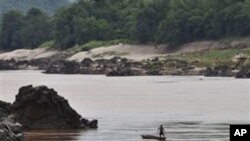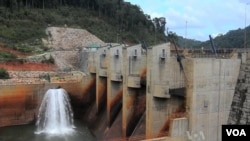Networks of fishing communities from Cambodia and Thailand are banding together to try to halt hydropower dam construction along the Mekong River. Community leaders and environmentalists warn disrupting the water flow and fish migration will impact millions of lives in the lower Mekong Region, and they are now working together to try to convince governments to abandon the projects.
The campaign by the networks brought together local fishing communities from Thailand and Cambodia who collectively fear the potential loss of livelihoods from the damming of waters along the lower reaches of the 4,300 kilometer Mekong River.
Millions of people in Cambodia and Thailand directly depend on access to fish for food security. The fishing community networks say they oppose all large scale hydro-power dams in the Mekong basin. Up to 11 hydro-power dams are planned on the Lower Mekong.
After years pressing their cases against individual dams, they are now trying to join forces and lobby each government in the region.
Om Savath is executive director of the Cambodia-based Fisheries Action Coalition Team (FACT).
"We try to push the government especially the Cambodian government and other countries to study, to stop the dam along the Mekong River, especially the Don Sahongm because it is near the Cambodia border with Laos. This will have a lot of effect to the fisheries," ha said. "We are joining together especially from Cambodia networks, Thailand, Lao and Vietnam. We plan to connect to Myanmar."
The networks called for Laos to halt construction of the $3.5 billion Xayaburi Dam in northern Laos and stop the planned 260 megawatt Don Sahong dam near the borders of Cambodia and Thailand.
Scientists say the Don Sahong dam, would impact vital fish migration. The area is considered to be the only secure fish passage during the region's dry season.
Premrudee Daoroung, co-director for the non-government Foundation for Ecological Recovery, says local communities need to have to say in the future as any development will directly affect their livelihoods.
"The people need to have more voice directly, people who are going to be directly affected face the impact from the dam," sha said. "In the movement on the hydropower dam in the Mekong there are many groups involved, (but) that the strongest voice in terms of the local people are Thailand and Cambodia."
Dam construction on the lower Mekong in Laos impacts Thailand where several rivers are tributaries of the Mekong mainstream. In north eastern Thailand's Ubon Rathchathani province the Pak Mun River communities have fought for almost 30 years against a dam and later to ensure flood gates are regularly open to allow fish access from the Mekong.
Leader of the Pak Mun river community, Sompong Viengchan, says a dam at Don Sahong would have a major impact on stocks and lives in the local community.
"I can say very clearly that any dam that is built on the river, like Mun River when they cut us off from our own river," sha said. "And it is going to be the same about the Mekong as well. The Mekong is the River of us all. If the Don Sahong really happen, the Pak Mun people cannot live as well, it will immediately affect us."
In Cambodia up to six million people are directly dependent on fish for food security from the Great Lake, or Ton Le Sap.
The leader of the Ton Le Sap Fisher network, Long Sochet, says those communities fear the future if the Don Sahong dam goes ahead.
Long Sochet says to block the water from the Mekong would cause fishing stocks to fall rapidly leading to the suffering of local people due to the loss of livelihood and the impact on the natural resources.
A study by the intergovernmental body, the Mekong River Commission (MRC) -which brings together Laos, Thailand, Cambodia, and Vietnam, has warned damming the Lower Mekong could reduce fish stocks by up to 300,000 metric tons a year, hitting hard communities in Cambodia.
In Phnom Penh in early September activists rallied against Malaysian-based investors backing the Don Sahong dam project, with some quarter of million signatures and identities pressing for a suspension of the project.
In June the Laos government agreed to participate in a prior consultation process (PNPCA), seen by analysts as a concession by Laos in the face of rising criticism over the Don Sahong dam.
But groups such as Save the Mekong Coalition (SMC) have raised concerns the process was inadequate and raised the issue in letters to the Prime Ministers of Laos, Cambodia, Thailand and Vietnam.
Vietnam has taken a strong stand on the projects. In April at a summit of Mekong leaders, Vietnam called for a 10 year moratorium on all damming construction on the Mekong mainstream.
Vietnam's state controlled media had said dams on the Mekong River were already impacting farming by disrupting water flow, leading to increased salinity, soil run off valued as a natural fertilizer, flooding and lower fish stocks.





